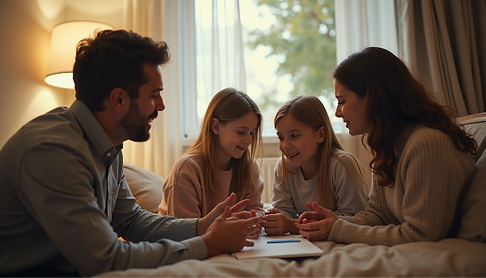UNITE
Holistic personal, couples and family counseling in the spirit of Kabbalah.

Liat Rosenshtein
Holistic Relationship & Family Healing
Liat Rosenshtein is a certified counselor for individuals, couples and families. She is also a parenting coach and licensed mediator with expertise in chapter two relationships. Founder of the “Loving home”. Liat believes that self-love and understanding love, is mandatory. We all want healthy happy relationships. Her method, The “Love Traffic Light”, helps people understand what brings them closer and what creates distance in their relationships. With a Master's degree in Family Studies and many years of experience, she offers both knowledge, deep empathy and positive results. Liat invites you to take a step toward clarity, balance, and better relationships – through honest communication and meaningful growth.
Services
Posts
Frequently asked questions

Divorce and Children
Divorce is a significant change in the lives of everyone involved, especially when children are part of the equation. While parents adjust to their emotional upheavals and decisions, the effects on children can be deep and lasting. Understanding how divorce impacts children is vital to ensuring their well-being during this tough time. Understanding the Emotional Impact When a couple chooses to divorce, it often highlights long-standing issues, leading to an irreconcilable split. For children, the marriage and the home symbolize security. When that stability ends, it can spark feelings of confusion, fear, and anxiety. Eye-level view of a family discussing emotions together For instance, a study showed that 20% of children whose parents divorce experience significant emotional challenges, including anxiety and depression. Children may worry about where they will live, the dynamics of their parents' relationship, and their personal future. They might feel abandoned, guilty, or even wonder if they played a role in the divorce. Parents must communicate openly and provide consistent reassurance, emphasizing that they are loved and that the divorce is not their fault. Restoring Stability and Security Amid these emotional challenges, it's crucial for children to regain a sense of stability. Parents, often overwhelmed by their own feelings during the divorce, may struggle to address their children’s needs effectively. Family counseling can be invaluable. For example, studies show that families who participate in counseling during a divorce experience 30% less emotional distress, helping parents learn to foster a supportive environment for their children. Counselors can guide parents in establishing consistent routines and promoting open communication. Regular family meetings can offer children a platform to share their thoughts and feelings, helping them process these major changes. The Role of Communication Effective communication is crucial during a divorce. Parents should engage their children in age-appropriate conversations about the situation. While it might feel easier to shield them from tough topics, this can lead to confusion and anxiety. Transparency is key. By discussing the divorce openly—while maintaining respect for each other—parents can help normalize the process for their children. This openness reassures kids that both parents will remain a part of their lives, despite the changing circumstances. Support Systems Children can significantly benefit from strong support systems. This includes relationships with extended family, friends, and even counselors. According to a report, children with strong peer relationships after divorce have a 40% lower risk of developing emotional issues. Encouraging connections with supportive adults creates additional safe spaces for children to express their feelings. Peer support is also valuable. Talking to friends who have gone through similar experiences can help diminish feelings of isolation and confusion. Close-up of a supportive environment for children Encouraging Healthy Coping Mechanisms Divorce can lead to varied emotional responses from children. It's essential for parents to promote healthy coping strategies. For example, engaging in physical activities like sports or arts can provide a vital outlet for stress relief. Encouraging children to explore hobbies or new interests can serve as a constructive distraction. Teaching simple mindfulness techniques can also help them manage their emotional responses during this challenging period. Fostering Emotional Intelligence Developing emotional intelligence is especially important during times of transition. Parents should support their children in recognizing and expressing their feelings. It's crucial to let them know that it's normal to feel sad, angry, or confused. This acknowledgment can prevent deeper emotional issues in the future. By modeling healthy emotional expression, parents can demonstrate effective ways to manage feelings. This not only aids children immediately but equips them with essential skills for future challenges. Moving Forward Together Life after divorce can be seen as a new beginning, opening doors to fresh opportunities and connections. Parents are critical in helping children adapt to their new reality. By focusing on stability, maintaining open communication, and providing emotional support, families can emerge stronger from the divorce process. Patience is key for both children and parents. Healing takes time, and acknowledging difficulties can help facilitate healthier coping mechanisms. Final Thoughts Divorce profoundly impacts children. When a couple decides to part ways, the emotional ripple effects on children can be substantial. Providing love, support, and clear communication during this critical transition is essential. Seeking professional help, fostering open discussions, and encouraging emotional expression are effective ways for children to manage their feelings. Embracing this journey together not only promotes healing but can also strengthen family bonds. Investing effort in the emotional health of children ensures a more positive environment where love and support thrive, even during times of significant change.
A Cold Partner
One of the most common statements I hear in my clinic is that a partner feels emotionally cold. This reflects unmet needs in the relationship when it comes to warmth, closeness, appreciation, love, intimacy, and physical connection. A Cold Partner If we pause and think about it, what brought two people together in the first place was attraction, emotional closeness, and the warmth that developed between them. That feeling of being connected through love and intimacy created a shared hope for a life together. In reality, relationship and family life often become filled with emotional and practical challenges. At times, these challenges feel overwhelming or even like survival mode. In such periods, the relationship can take a back seat to the demands of everyday life. Statements like “she never wants to spend time with me alone - as soon as the kids fall asleep, she’s asleep too” or “he goes straight to the computer after dinner and doesn’t see me at all” are not rare. Even when intimacy exists, it doesn’t always feel emotionally close or meaningful. Ask yourself: do you feel excited at the thought of spending time with your partner? Do you enjoy each other’s company? Do you create quality time together as a couple? Do you remember how important it was in the beginning to show each other how much you missed, enjoyed, and desired one another? That need still exists - though in a different rhythm - even after many years. Intimacy, warmth, and closeness are essential to keeping the flame alive. The sense of rejection felt by a partner who lacks emotional connection can grow into a deep emotional distance that is not always easy to repair. Emotionally, this may be interpreted not only as rejection but also as a lack of love, emotional alienation, or even hostility. If you want your partner to feel loved and desired, recognize the importance of warmth and closeness in your relationship. Make the time and find the energy to nurture it. It’s more important than you think. And if a crisis has already formed, seeking couples counseling is the right step. It will help you move through the difficulty and develop stronger tools to support your relationship moving forward.


The Impact of Criticism on Relationships and How to Handle It
Criticism is an inseparable part of every relationship. We all wish the people we love, especially our partners, would see us as perfect. But perfection doesn’t exist. Criticism arises directly or indirectly in most intimate relationships. The real question is: How do you respond when criticism is directed at you? The Impact of Criticism on Relationships and How to Handle It Most people tend to react in one of the following unhelpful ways: Defensiveness - denying the situation, claiming it never happened, or accusing the other person of overreacting. Victimhood - saying, “I’m doing so much and you never appreciate me” or “No matter what I do, you always focus on what I’m doing wrong.” Counterattack - responding with blame, pointing out the other person’s flaws or failures. These reactions escalate the situation. They create an endless ping-pong of blame, hurt feelings, and emotional distance. What’s worse - these responses rarely solve anything. Instead, the same criticism will likely resurface again and again, with even more emotional damage each time. Why do we react this way? Because criticism is uncomfortable. It’s hard to hear that someone we love is unhappy with us. So we instinctively push back. But those reactions only make things worse and harm the relationship. So what’s a better way to deal with criticism? The answer is simple, but not always easy: accept it. Accepting criticism starts with recognizing that your partner is struggling with something you said or did. It doesn’t mean you have to agree with them - it means acknowledging that your choice affected them in a way that caused discomfort or pain. In relationships, criticism often comes from a place of emotional impact. Your actions might trigger pain, insecurity, fear, or sadness in your partner. And because we care about each other’s happiness, it’s important to learn how to respond in ways that bring calm and connection rather than conflict. For example, saying: "I understand that my choice was hard for you. Help me understand why - what would you have preferred?" is a powerful and emotionally intelligent response. It shows that you’re open to listening and willing to understand their emotional experience. This doesn’t mean you must agree to everything your partner wants. It means both people share their feelings and needs, and together you reach a compromise you both can live with. When someone is hurt by the person they love, the first thing they need is for their feelings to be seen and validated. That’s the path toward real understanding and long-term solutions. Why is learning to accept criticism so important? Because through criticism, we discover the emotional sensitivities of our partner. We get to know them on a deeper level, and that emotional intimacy becomes a source of strength. We learn how to calm their fears, how to support their needs, and how to truly connect during difficult moments. Remember - the way we respond makes all the difference. Choose communication that is not blaming or harsh, but instead focuses on the emotional difficulty and the desire to resolve it. There’s no real gain in using hurtful communication, even when we’re feeling hurt ourselves. For a happier, healthier relationship - contact us today.







